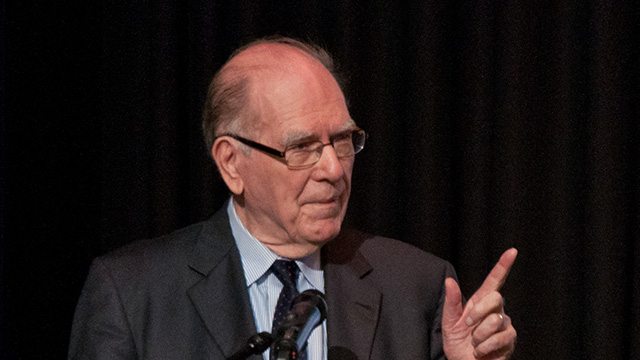 Transcript
Transcript
Current economic problems are only a particular expression of a systemic crisis of mankind, a crisis whose character is changing. The most important developments, as usual, are taking place outside the realm of the economy. They involve a fundamental change in mankind’s relationship to nature.
We are operating today according to the law of conservation of risk: minimizing individual risks in a closed system increases systemic risk—until the system breaks apart.
We have seen this in the U.S. stock market, where the derivatives system reduced risks for investors in top-rated corporate bonds to levels an order of magnitude lower than the risks borne by the issuers of such bonds. Individual risks were minimized, while total potential risk was driven to a systemic level, and the system collapsed….
Meanwhile, since the beginning of globalization, the development of technology has turned the shaping of consciousness into the most profitable type of business that is easy for people to get into. Being “the most profitable that it is easy to get into” makes it also the most widespread. This means that a person’s main preoccupation now is no longer to change the world around him, but to shape his own mind. Mankind’s very mode of action is changing. In our entire history as a biological species, there has never before been such a transformation.
The human mind is being turned into an object of the most intense and chaotic influences. The appearance of a huge number of feedback links makes the world more difficult to grasp. This lessened intelligibility of the world increases demand for mysticism and reduces the thirst for science, and therefore, for education, too. Education then degenerates into a tool of social control. Mankind is becoming more primitive and dehumanized, sliding into a new Dark Age.
From a strictly economic point of view, this could be explained as the adaptation of social relations at all levels (from the family to the state)—relations developed in association with industrial technologies that are now disappearing—to new, post-industrial technologies. The first set of these has been informational technologies, with biological technologies likely to be next. When discussing economic issues, however, it should be borne in mind that these changes are much broader and deeper than the range of phenomena studied by economics.
Financial Breakdown Crisis
People underestimate the depth of the global financial crisis because they ignore its fundamental cause: the exhaustion of the previous global development model after the destruction of the Soviet Union. Having defeated us in the Cold War, the West egotistically reshaped the world in the interests of its global corporations, denying normal development to the territories thus acquired (to prevent competition against these corporations).
But this limited the markets available to the developed countries themselves, creating a crisis of overproduction—not primarily of traditional commodities, but rather of information and management technologies aimed at changing people and managing them: high-hume, ((This sociological jargon term, referring to technologies intended to change the human mind, both individually and on a mass basis (political technology, public relations, marketing, etc.), has become popular among Russian analysts.)) rather than high-tech.
Lending to the underdeveloped world to stimulate demand, an attempted crisis exit route that was found by instinctive groping, caused the 1997-99 debt crisis, which boomeranged against the United States in 2000-01.
The United States has been dragging itself (and the world economy, of which it is the linchpin) out of the recession using two strategies.
“Pumping” the market with unrecoverable mortgage loans no longer works.
The second strategy is to “export instability,” undermining competitors and forcing their financial and intellectual capital to seek “safe havens” in the West. The growing instability is used to justify an increase of military spending in the U.S.A. itself, providing a stimulus for the economy and for technology (such “military Keynesianism” was used effectively by [former President] Reagan). This strategy, implemented in 1999 in Yugoslavia against the Eurozone, ran its course in Iraq. The Arab Spring and the terrorist war against Syria show that the strategy of “exporting instability” has degenerated into “exporting chaos,” which is also dangerous for the United States: Washington does not try to administer the areas it destabilizes, and these have become a catalyst for a global military and political crisis.
According to the Obama Doctrine, the U.S.A. has to act as much as it can through others, wasting the resources of its NATO satellites rather than its own; the idea is not to “Americanize” non-Western societies, but to plunge them into self-perpetuating chaos, thereby to control whatever resources they have, using a minimum of military force. That is the reason for the alliance with Islamic terrorists, which [former Vice President] Cheney had promoted and which became obvious in Libya and Syria.
In financial terms, however, this strategy appears to be inadequate for maintaining sufficient demand for the dollar, and thus preserving the status quo.
The West today is not trying to increase its competitiveness, but simply to push the world back to the 1990s and 2000s—a world which is gone forever—when, under the guise of talk about globalization and humanitarian interventions almost everywhere, even in Eastern Europe, what developed was essentially a new brand of colonialism.
This means that the West has lost the strategic initiative, and so far, there is no one else to pick it up.
The organic inability of the United States to relinquish even a small part of its current interests for the sake of solving its own strategic problems, its truly devastating egoism, is thrusting new powers to the forefront of global development: the European Union, China, and, if our leaders have enough intelligence, Russia, thereby ending the Pax Americana.
From what we understand, the integration of humanity has once again, as in the early 20th Century, exceeded the capabilities of its governing systems; now mankind has been forced to reduce the depth of this integration, taking a step backwards and partially restoring governability through more primitive processes.
The Global Monopolies
The purely economic aspect of the current crisis is the state of decay of the global monopolies. There is no scope for external competition in the global market. Technological progress, which could be a source of competition, is hampered both by these monopolies (including their abuse of intellectual property rights), and by the absence of significant non-economic threats (without which the discovery of new technological principles, as distinct from their subsequent commercialization, is not profitable).
Therefore, the decay of the global monopolies will continue until it leads to a breakdown into depression. Due to lack of demand, the single global market will disintegrate into an intricate system of macro-regions; the reduced size of the markets will lead to the loss of a number of technologies and to technogenic catastrophes.
The macro-regions will engage in harsh and chaotic cultural, political, economic, and technological competition, as in the period between the First and Second World Wars. Perhaps the very formation of these macro-regions will limit the absolute power and, therefore, the decay of the global monopolies; despite their power, their access to the macro-regions of “others” will be limited. That is precisely why this scenario is unacceptable to the global ruling class and the U.S. leadership, which comes closest to expressing the interests of that class. They prefer to plunge potential macro-regions into chaos, rather than allow them to hive off from global markets that are controlled by the global monopolies.
Nevertheless, it may be assumed that equilibrium will be achieved for some period of time through the restoration of a bipolar political system (counterposing the U.S. and China, with the European Union, Japan, India, and possibly Russia serving as a balance, analogous to the Non-Aligned Movement) and a multi-currency economic system (each currency zone will have its own reserve currency).
The fundamental problem of development today, however, is not the egoism of the United States, not the lack of liquidity, and not the debt crisis, but the lack of a source of economic growth in the United States, and along with it, in the entire world economy. There is nothing to alleviate the global monopolies’ crisis of over-production and create a new economic engine to replace the broken ones. This means that the crisis will not end in a recovery of the world economy, but in a long and quite severe depression.
Reversion to Mysticism
The situation is aggravated by the proliferation and constant improvement of computers, which are the embodiment of formal logic. Access to them puts us all on the same level, and competition among individuals and groups is gradually beginning to be based not on logic, but on non-logical thinking: both creative and mystical.
The impossibility of educating people in this kind of thinking, as easily as the ability to think logically is taught, makes competition more biological and less social than we are accustomed to consider acceptable. This will increase the downward trend in the social significance of knowledge and the quality of our specialists, a process that threatens to cause technological catastrophes because of our inability to maintain existing infrastructure.
The growth of mysticism, stiffer global competition, and the emergence of a global ruling class which, having neither voters nor taxpayers nor influential shareholders, is essentially free from responsibility—all of this will dehumanize society.
Destruction of the Middle Class
The proliferation of information technology is leading to a crisis of governance, including a crisis of traditional democracy, which is ceasing to function before our very eyes.
The exhaustion of the liberal and market-oriented paradigm has been apparent since the 1997-99 currency crisis of the underdeveloped countries. Remember that the current market paradigm assumes that a person lives for profit, and the liberal paradigm puts the state at the service of global business, not of its people.
One manifestation of the exhaustion of the liberal paradigm is the elimination of the middle class.
For one thing, if there is too much debt and the money supply cannot be increased any further, then the global monopolies begin to cut costs. This means reducing the consumption of that part of the population, which is already consuming from the market more than it produces (although it can provide human capital, which is not a market product)—that is, the consumption of the middle class.
Secondly, super-productive post-industrial technologies are making the middle class superfluous. The global monopolies have destroyed the middle class in Africa, Latin America, and the post-socialist countries. Now they are destroying it in the heart of the capitalist system: the United States and the developed countries of Europe. The impoverishment of the middle class in developed countries—the infamous “golden billion”—will not save anybody from the crisis, but it is shifting this crisis into new post-economic and post-democratic dimensions.
After all, democracy exists on behalf of and in the name of the middle class. After its downfall, democracy will degenerate into a new dictatorship, based on the reshaping of minds. This will complete the process of dehumanization and the repudiation of civilization. We will see the West reject individual sovereignty and self-consciousness, that most important achievement of the Enlightenment, and revert to the Middle Ages—perhaps because of a disaster that smashes the public and individual psyche. The first step in this direction has already been taken: Descartes’ maxim, “I think, therefore I am,” has been replaced by a more profitable business formula: not even “I consume,” but rather “I buy, therefore I am.”
Advertising tells us that when a particular brand label is attached to an item, its price increases many times over. This means that the mass exchange of goods and services has already become inequitable. And inequitable or “non-equivalent” exchange is nothing but stealing. If stealing has become the norm, that means that the traditional market no longer exists. And this is natural: The impoverishment of the middle class deprives a modern economy of demand, and an economy without demand is a non-market economy.
At the same time, the systemic loss of control by the owners of large corporations over their senior executives, strictly speaking, abolishes private property, and, with it, capitalism in the classical sense. Thus traditional democracy and the market have come to an end; we just haven’t recognized this fact yet.
The crisis of democracy and the development of a global ruling class, exercising external control over all the rest of humanity, tends to revive systems of governance that are covert in nature, like the medieval orders.
These systems accumulate knowledge; but hidden knowledge, by its very nature, will inevitably die, degenerating into rituals. So the computerized Middle Ages that is bearing down on us and is so relished by a section of the global ruling class, will not remain computerized for very long.
Thus, a painful and deep retrogression awaits us, with considerable loss of life: a kind of plunge into a new Dark Age….
Russia’s Potential Contribution
We do not know whether humanity will succeed in avoiding a catastrophic continuation along this route, but we must make every effort to prevent it.
The task is two-pronged: to preserve the technologies we have and continue technological progress, despite the contraction of markets (and, consequently, a reduced division of labor), and to save humanism by putting an end to the general dehumanization.
Russia has considerable prerequisites for solving this problem.
For one thing, the Soviet military-industrial complex created the basis, which has largely been preserved, for super-productive so-called “closing” technologies, ((A “closing” technology, in Russian zakryvayushchaya tekhnologiya, is one that produces such economies of labor and other resources that it may cause the shutdown of less advanced industries.)) which are distinguished from traditional technologies by their cheapness and simplicity. Although these have been blocked by the monopolies, after the collapse of the latter in the global depression they will be able to maintain their high profitability even in small markets.
Secondly, our culture is fundamentally humanistic because of the exceptional significance it attributes to the pursuit of justice. The pursuit of justice yields ongoing advantages, based on a preference for the effectiveness of society as a whole over the effectiveness of any individual firm; this is an essential precondition both for collective survival and for the preservation of humanism.
Russian culture is fundamentally messianic: The bearers of this culture do not live without a grand purpose, even when they are living in comfort (this is a common feature of the human species). Moreover, they are capable of independently generating such a grand purpose, even at the brink of ruin.
This allows Russia to make a serious attempt to find a way out of the trap in which modern society finds itself, through a kind of “technological socialism.”
Translated from Russian by Susan Welsh






















